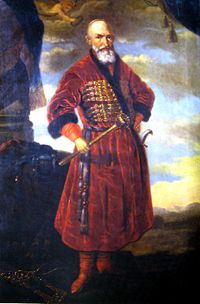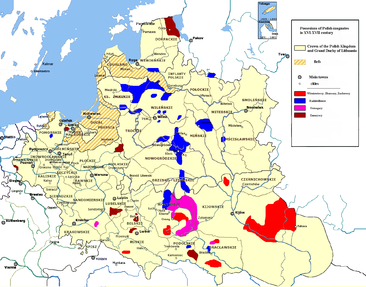- Magnate
-
Magnate, from the Late Latin magnas, a great man, itself from Latin magnus 'great', designates a noble or other man in a high social position, by birth, wealth or other qualities. In reference to the Middle Ages, the term is often used to distinguish higher territorial landowners and warlords such as counts, earls, dukes, and territorial-princes from the baronage.
The term was specifically applied to the members (equivalent to British Peers) of the Upper House in the Apostolic Kingdom of Hungary, the Főrendiház or House of Magnates.
Magnates were a social class of wealthy and influential nobility in the Kingdom of Poland and Grand Duchy of Lithuania (and later the Polish-Lithuanian Commonwealth), and some other medieval realms. In Spain, since late Middle Ages there is the highest class of nobility who hold appellation of Grandee of Spain. In Sweden, wealthiest medieval lords were known as storman (plural stormän), "great men", a similar description as magnate, and same meaning. In England, the term magnate has often been applied to the extremely powerful nobles that Edward III created when he split his kingdom amongst his sons rather than choosing one son to inherit the entire kingdom. The ensuing conflict between these powerful nobles (and their successors) and whoever was king led to the aristocratic wars known as the Wars of the Roses. A similar class in the Gaelic world were the Flatha.
In the Middle Ages a bishop sometimes held territory as a magnate, collecting the revenue of the manors and the associated knights' fees.[citation needed]
Contents
Magnates in Poland and Lithuania
In Poland and Lithuania all members of the nobility (szlachta) were equal under the law. "Magnate" (Polish: magnat) was thus not an official title but rather a position of social class, based on wealth. Magnates (or higher nobility) vied for political power with the lesser and middle nobility (see Ruch egzekucyjny) and the Król (Monarch). From the second half of the 17th century, the magnates emerged as the victors in the struggle for power in the Polish-Lithuanian Commonwealth, as they were able to concentrate most of the land in their own hands and bribe smaller nobles to preserve the appearance of democracy: "Golden Liberty" in the parliaments, not only the local Sejmiks but also in the national Sejm.
There were several other terms for "magnate" in Poland and Lithuania:
- Możny - "powerful one"; used up to the 15th century, later replaced by Magnat;
- królik, plural królewięta - "petty kings", used especially of magnates with large fiefdoms in Lithuania or Ukraine; rather negative (król in Polish means "king", but the diminutive królik also means "rabbit");
- pan - lord (much later, by title devaluation, Mister); this could also apply to members of the common szlachta and was often used by people from other social classes;
- starsi bracia - "older brothers"; all members of the szlachta referred to each other as Pan brat ('lord brother'), but Magnates who were appointed to the Senate of Poland often styled themselves senior brothers, referring to the nobles from the Sejm ("parliament") as młodsi bracia ("junior brothers");
- karmazyn - "the crimson one", from their expensive crimson-coloured clothing (especially the boots).
Several Magnates held high feudal titles or peerage ranks such as prince or count. With few exceptions, mostly dating from the Union of Lublin, and special privileges permitting some Lithuanian magnates to use them, such titles were forbidden by law. Titles from offices however were very popular: see Offices in Polish-Lithuanian Commonwealth.
Magnates in England
The large number of extremely powerful nobles, many of whom had claims to the throne, led to over 100 years of aristocratic civil war, in the form of the Wars of the Roses.
Eventually intermarriage between the royal family and the higher nobility led to large numbers of claimants to the throne, most of whom tried to attain the throne by usurping their predecessors. In this period, despite laws governing succession, most of the succession was determined not as much by primogeniture as by military victory.
In the Tudor period, after Henry VII defeated Richard III at Bosworth Field, Henry made a point of executing or neutralizing as many magnates as possible. Henry VII would make parliament attaint undesirable nobles and magnates, thereby stripping them of their wealth, protection from torture, and power. Henry VII also used the Court of the Star Chamber to have powerful nobles executed. Henry VIII continued this approach in his reign; he inherited a survivalistic mistrust of nobles from his father. Henry VIII ennobled very few men and the ones he did were all "new men": novi homines, greatly indebted to him and having very limited power.
See also
- Aristocracy
- Leidang
- List of szlachta (this article lists the families of the magnate class, or higher nobility).
- Swedish nobility
Sources
 This article incorporates text from a publication now in the public domain: Chisholm, Hugh, ed (1911). Encyclopædia Britannica (11th ed.). Cambridge University Press.
This article incorporates text from a publication now in the public domain: Chisholm, Hugh, ed (1911). Encyclopædia Britannica (11th ed.). Cambridge University Press.
[1] Allison Weir, Princes in the Tower.
Categories:- Social classes
- Dukes
- Noble titles
- Polish nobility
- Belarusian nobility
- Lithuanian nobility
- History of Poland (1569–1795)
- Ukrainian nobility
- History of Ukraine
Wikimedia Foundation. 2010.


